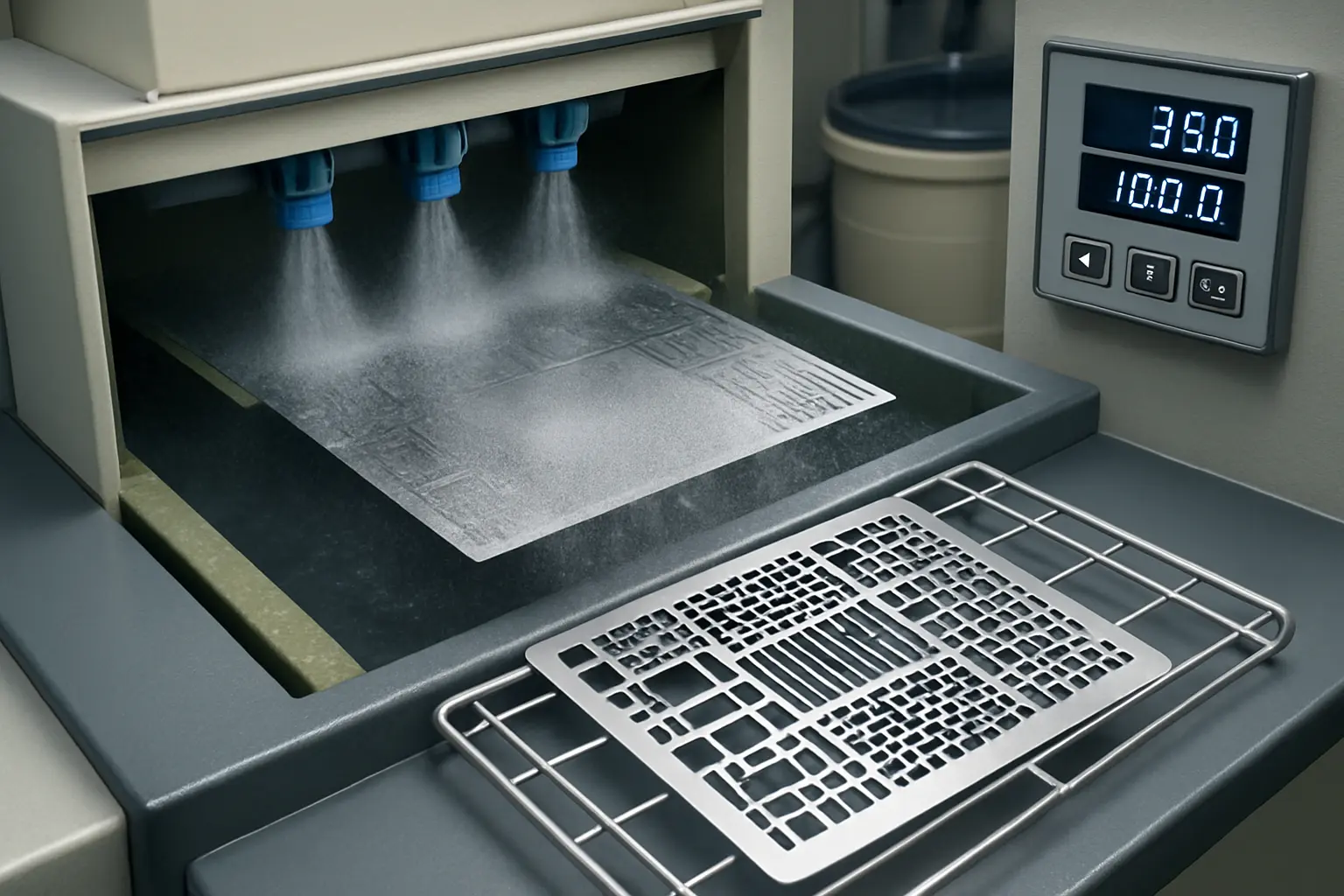
Chemical Etching Services
NEXAMS Leading the Way in Chemical Etching, Laser Etching, and Advanced Etching Solutions Across Industries
Chemical etching is a subtractive manufacturing process where controlled chemical solutions are used to selectively remove material from metal surfaces, producing intricate patterns, components, and designs. At NEXAMS, we deliver this service with an empathetic, ethical approach—aligning decision-making with the real needs of our clients, while collaborating closely with trusted Vendors, a dependable Supplier chain, and certified Manufacturers. This ensures quality is consistent, timelines are respected, and strong Support is available through local and nearby networks to meet urgent or specialized project demands.
Our offerings span from acid etching, etching aluminium, and acrylic etching to advanced laser etching for high-definition, intricate outputs. Using state-of-the-art etching machines, we provide scalable solutions optimized for both prototypes and high-volume production, with our chemical etching automation solution ensuring consistent results. Our processes are designed in partnership with Suppliers who share our commitment to ethical sourcing, enabling stress-free, burr-free, and high-tolerance metal etching that exceeds industry expectations.
Benefits of Chemical Etching Technology
• Stress-free, burr-free chemical etching for delicate and complex designs, enhanced by partnerships with skilled Vendors.
• Exceptional detail and accuracy in laser etching and metal etching, validated by our Supplier network.
• Cost-effective production using advanced etching machines and collaborative Manufacturers.
• Scalability for etching products from single prototypes to full-scale production, with reliable Support from local teams.
• Precise etching chemical control for various materials, including etching aluminium and acrylic etching, sourced via vetted Suppliers.
• Chemical etching automation solution delivering fast, repeatable output, supported by nearby resources for quicker turnaround.
• Strict chemical etching quality control methods for consistent results, implemented in cooperation with ethical Vendors and Manufacturers.
Industrial Application and Use Cases
• Electronics: Circuit boards and micro-components crafted through chemical etching, with production aided by local Suppliers.
• Aerospace: Lightweight structures manufactured with acid and metal etching in partnership with certified Vendors.
• Automotive: Precision etching aluminium components for engines, coordinated with specialized Manufacturers.
• Medical Devices: Surgical tools and implants processed under rigorous quality control with Support from nearby partners.
• Architecture: Decorative panels produced via laser etching, sourced from ethical Suppliers.
• Signage: Customized nameplates using advanced etching machines provided by reliable Vendors.
• Industrial Filters: Complex meshes for filtration, produced with coordinated input from Manufacturers and Suppliers.
Material Used in Chemical Etching Technology
• Stainless Steel – Preferred for its durability, supplied by trusted Vendors for metal etching applications.
• Aluminum – Lightweight and corrosion-resistant, ideal for etching aluminium projects managed with Support from local suppliers.
• Copper and Brass – Used in detailed laser etching and acid etching, sourced from ethical Suppliers.
• Nickel Alloys – Precision parts made using controlled etching chemical solutions with experienced Manufacturers.
• Acrylic – Transparent acrylic etching for signage, delivered in collaboration with nearby vendors.
• Titanium – Specialized medical-grade chemical etching supported by compliant Suppliers.
How Costing Works
Our costing considers material type, design complexity, and production volume, ensuring transparent communication with both Vendors and Suppliers. The chemical etching automation solution reduces labor while improving throughput, allowing us to handle small runs and large orders efficiently. With Support from local and nearby manufacturing facilities, we meet tight deadlines without sacrificing quality, keeping our decision-making ethical and client-focused.
Alternative Technical Suggestion
• Photochemical Machining (PCM) — Ultra-fine chemical etching of thin metals with input from specialized Vendors.
• Laser Ablation — Non-contact precision method supported by advanced Suppliers.
• Electrochemical Etching — Complex alloy processing managed by skilled Manufacturers.
• Hybrid Laser-Chemical Etching — Combination technique coordinated with nearby facilities.
• CNC Engraving — Ideal for thicker materials, offered with reliable Support from experienced Vendors.
FAQs
Q: What is Chemical Etching and How Does It Work?
A: It is a manufacturing method that selectively removes material using chemical solutions, carried out under strict quality standards with equipment from reputable Suppliers and guidance from expert Vendors.
Q: How Does NEXAMS Ensure Etching Quality?
A: Through chemical etching quality control methods, real-time monitoring, and automation solutions, supported by local and nearby Manufacturers for consistent results.
Q: What Materials Can You Process?
A: Stainless steel, aluminium, copper, nickel alloys, and acrylic, all sourced from ethical Suppliers.
Q: Difference Between Laser and Acid Etching?
A: Laser etching uses high-energy beams, while acid etching uses chemicals—both provided with reliable Support from Vendors.
Q: Can You Handle Bulk Orders?
A: Yes, with automation and scalable resources from trusted Manufacturers and Suppliers.
Q: Suitability for Industrial Applications?
A: Ideal for aerospace, automotive, electronics, and more, with production coordinated through local facilities.
Q: Do You Etch Aluminium Components?
A: Yes, with precise control and ethical sourcing from Suppliers.
Q: Why is it Cost-Effective?
A: Low tooling costs, design flexibility, and automation make it ideal—supported by dependable Vendors.
Q: Do You Offer Acrylic Etching?
A: Yes, with decorative and functional finishes managed by nearby Manufacturers.
Q: Safety Standards?
A: We follow strict protocols, ensuring chemical handling safety and environmental compliance, with oversight from Suppliers and Vendors.
A: By Sea: Asia: 15–20 days, Europe: 25–35 days, North America: 30–40 days, South America: 35–45 days, Middle East: 14–18 days, Africa: 20–28 days, Oceania: 22–30 days
By Air: Asia: 1–3 days, Europe: 3–5 days, North America: 4–6 days, South America: 5–7 days, Middle East: 1–2 days, Africa: 3–5 days, Oceania: 4–6 days
